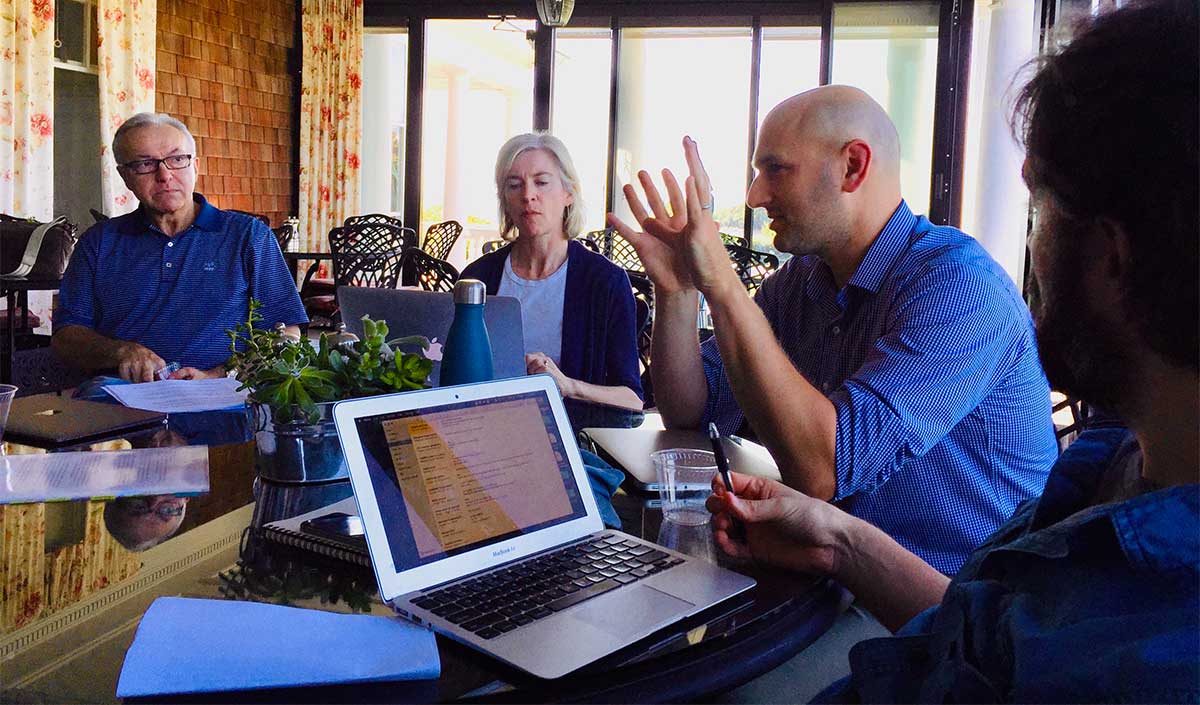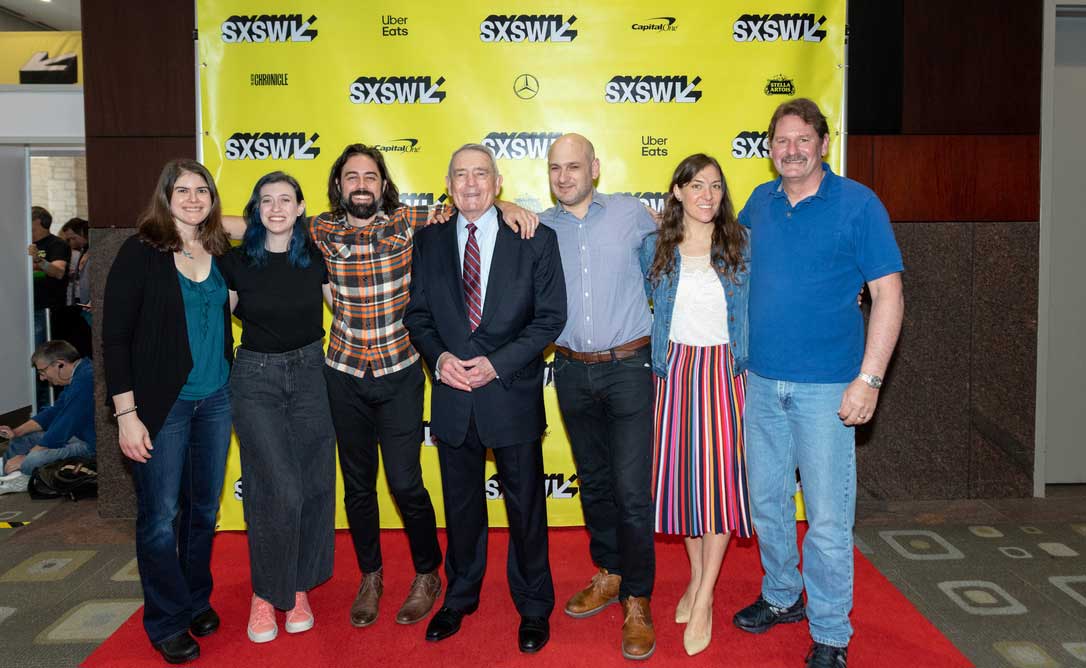What’s your background?
My father is a scientist, so I like to say I was raised in a lab. Well, not exactly. But it was like a second home. Hanging out in the research bays, flicking pipette tips as if they were footballs, talking to semi-intoxicated grad students and postdocs at lab parties, seeing the worry of a grant application, was just part of my childhood. I wouldn’t be the first child to not follow a parent’s career path and in the end, I decided to study history and literature in college. I eventually found my way into the world of journalism and documentary film, working for many years at CBS News. But I always was interested in science, and more particularly, how it can be communicated. And this wasn’t just the facts of science, but the culture, the idea of asking questions, going behind the horizons of knowledge. I felt we needed to experiment in science storytelling, particularly in a video format. We needed to challenge conventional wisdom and our own unconscious biases. So it was exciting to hear about iBiology.
What are you passionate about?
I am passionate about trying new things. I have always been a person who is impatient with doing the same thing over and over again just because it’s the way things have been done. I believe that innovation comes from building diverse teams and creating a space for the sharing of ideas, for testing our own assumptions and being ready to learn from others.

What brought you into science communication and education?
When I was working in the news business, I saw the sophistication with which many subjects were covered. Journalists would speak with knowledge and nuance on topics ranging from the societal divisions within the Mideast, to the economic forecasts on Wall Street, to the different classes of military hardware. But when it came to science, I found that there wasn’t this depth of understanding of how the global enterprise of research actually worked. I felt that if we could demystify both the knowledge of science and the process of research we could bridge some of the divides that exist between the general public and the scientific community. And this approach could also be applied to education. Science is a wonderful story. It’s full of journeys of discovery. It is much more diverse than it is often portrayed in the media. I wanted to try to figure out new ways to share these insights to inspire the imagination of both those who are interested in science and those who might find it intimidating.
What do you like most about your job?
It all starts with iBiology being a great place to work, and that’s because of the people I get to work with. Everyone has come from a different background, but they were drawn here by a desire to share their passion towards science with others. This is a laboratory, which is why we now call our enterprise the Science Communication Lab. We want to try new approaches to science communication, and we want to test our ideas. That means engaging with all of you. It’s refreshing to be part of a place with a lot of great ideas that doesn’t think it has all the great ideas. Getting feedback from you, the people that use our products, makes what we do more rewarding and I hope, impactful.
What is something you have learned while working at iBiology?
I have learned that scientists make great film and video producers. I should have known that because the best producers I worked with in my former career stops were people who were not afraid to ask questions, of others, and themselves. I feel there is a sense out there among many in the world of science that there are a few scientists who are natural communicators and most are not. I want to challenge that assumption. Almost everybody has a story to tell. We just have to find ways to unlock those stories and get them out into the public. The staff at iBiology has shown me that this is achievable on a broad scale.
Can you tell us about an exciting project you are currently working on?
It’s hard to pick just one. We have a feature-length documentary on CRISPR called Human Nature that has played around the world to great reviews and audiences. So that might seem to be an obvious highlight, and of course it is. But I am also proud of the projects that may be more modest in scope and scale but are also challenging the assumptions around science communication. Whether these are new approaches to science seminars or online courses on professional development, coming to work and trying to do something new is always exciting.

What does a typical work day look like for you?
Well we don’t have many office spaces for phone calls, and one of the job descriptions of an “Executive Producer” is “person on phone.” So I get my step count pacing the hallways of UCSF talking to our collaborators around the country, and the world. There are a lot of formal meetings as well. But what’s most fun about production is the informal interactions, the “hey can you look at this cut we just edited and let me know what you think about the graphic?” or the “yikes, this interview just canceled, what should we do?” We do travel on our productions, particularly the documentaries we produce. And that is always an adventure. But I find there is just as much adventure back in the offices thinking about what challenge we want to tackle next.
Do you have a favorite science communicator? What do you admire about them?
Okay. This may sound corny, but my favorite science communicators are my co-workers. I think we put too much prominence on fame and people with big platforms in society. What has struck me most is that I have found more people in science who can communicate than people who can’t, especially if they have help getting their story out. And that’s where I think the team at iBiology does such a good job.
Do you have any advice for a scientist looking to start a career in communication and/or education?
It’s trite, but it has the virtue of being true: practice, practice, practice. I guarantee you the people who you see as great science communicators put in the work, just like a basketball player shooting free throws or a ballerina doing pirouettes. It helps to find your voice, a way of speaking that you find natural. Try to not think of how audiences will judge you. Aim for authenticity and passion. Few things are more compelling than someone sharing what excites them. Once you have developed your style you can look for job opportunities with the confidence of knowing the why, what, and how of what you want to communicate.





Stacey Bindman says
January 31, 2021
Hello Elliot Kirschner,
I just watched “Human Nature” on cable TV, and I was much impressed with the production.
It was motivating, interesting, and for the most part produced in a manner that most people could understand.
Thank you for having participated in making this exceptional production, and I look forward to seeing more of what you will produce in the future.
Would you please pass on my thanks to all of the other producers Adam Bolt, Dan Rather, Meredith DeSalazar, Sarah Goodwin.
Sincerely,
(Mr.) Stacey Bindman
Montreal, Quebec